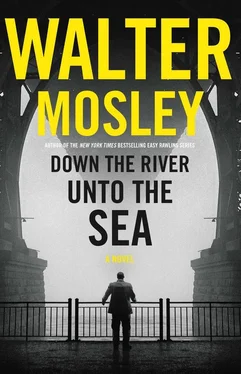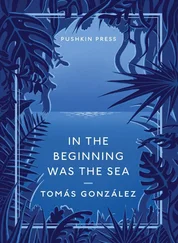“Now get your ass outta here and remember that your heart can stop beating too.”
He took his time standing from the chair.
I looked over to see that the bodyguard was also on his feet.
They both tried to intimidate us with their stares, but we knew that two cops couldn’t open fire in a New York place of business, and they couldn’t trust that we wouldn’t. After all, there was already one dead man across the river in Queens.
When Natches and his man were gone, Mel got up and sauntered over to me. I told the straw-headed, zaftig waitress to bring the bills for Mel and the bodyguard to me.
“You think they’re laying for us out there?” I asked Mel when the waitress went away to do my bidding.
“I hope not,” he said, “for them. But it doesn’t matter anyway.”
“Why not?”
“The reason I chose this place is that it has a little-known exit to the building next door, and that building has an exit on the alley behind.
“But even if that wasn’t true, I got three guys outside with all kinds’a firepower. I sent them photos with my cell phone and they’re the kinda guys that know when an ambush is set up.”
I smiled and told him about the conversation.
“He’s already in somebody’s crosshairs,” Mel pronounced.
“But who?”
Mel’s cell phone sounded.
“Yeah?” he answered. Then: “All right. Thanks.”
He put away the phone and said to me, “Nobody’s out there. The inspector and his man left in the same car.”
I picked up a crustless cucumber sandwich and took a nibble.
“You got a place to stay, King?”
“Storage unit in the West Village.”
“Huh.”
“Look, Mel, I appreciate your help. But right now I’m gonna look into some stuff. I’ll call you later on and maybe, if you got the time, you could help me again.”
“You sure the fuck need it.”
There’s a beautiful high-rise apartment building on Forty-Second Street a block or so east of Tenth Avenue. It’s constructed from plate glass and steel girders with a thirty-foot-high atrium for an entrance.
“May I help you, sir?” a caramel-colored, red-jacketed man asked. He was standing behind a four-and-a-half-foot-high green marble counter.
“Miranda Goya,” I said, happy to have at least one sentinel treat me with decorum.
He picked up a phone receiver, but before bringing it to his ear he said, “Your name?”
“Joe Oliver.”
Making all the right moves, the man said into the phone, “A Mr. Oliver for you, Miss Goya.”
He was younger than I by at least five years and had generous lips that were exactly the same tone as the rest of his skin. This unusual aspect gave the guardian a kind of specialized, almost synthetic, air.
“Twenty-eight thirteen,” he said to me.
“Thank you.”
The elevator was large and my only companion was a woman, probably in her eighties, who had mastered makeup well enough to take at least fifteen years off her appearance. She had a small black-and-white dog on a leash that was straining to get at me.
I like dogs. If some evolutionist had told me that men had descended from canines I would have believed her. All the brotherly passion, fang-baring hunt lust, and fear I feel on a daily basis I see in dogs.
I was a dog. I’d been told that my entire life — by men and women alike.
“I can’t let him greet you,” the lady said. She was wearing a fox wrap over an emerald cashmere sweater.
“He bites?”
“Pisses. He pisses on any man’s foot that gets close enough. He’s a bad boyfriend, but I love him.”
I nodded and felt real empathy.
“You in a new play?” she asked then.
“What?”
“The mustache,” she said. “And those silly sideburns.”
“How can you tell?”
“This is an actors’ co-op,” she explained. “Everyone here knows makeup, camera shots, and about hundred thousand lines of bad writing.”
“Just came from a dress rehearsal at BAM,” I said. “A play we’re debuting in Cincinnati. Right now I’m going to run some lines for another project.”
“With who?”
“I’d tell you, but I don’t think her husband would like it.”
The older lady with the dead fox around her neck smiled and bowed her head ever so slightly.
Dog lady got off at the fourteenth floor and I traveled alone to twenty-eight.
I walked halfway down the hall of doors to my left and pressed the button on the jamb of twenty-eight thirteen. There was no faraway sound of a bell or buzzer, but I didn’t want to seem impatient and so refrained from following up with a knock.
“Who is it?” came a woman’s voice.
“Joe Oliver.”
“You don’t look like him.”
I wondered if Lamont had somehow taken a cell phone picture of me or if he just told her what I looked like.
“I put on the mustache and shaved the head because I didn’t want anybody recognizing me on the case. I could call Mr. Charles at the Aramaya if you want.”
After a brief pause she pulled the door open.
Miranda Goya was one of the most beautiful women I, or the dog in me, had ever seen. She was in her late twenties but had the stance of a veteran. Her knee-length dress was composed of equal swirls of purple, red, and green. Her figure denied the garment and, I was sure, had betrayed her again and again from the age of thirteen. Her face was heart-shaped and haughty; the blended color of ethereal rose-gold and earthbound bronze informed her skin.
I crossed the threshold and she moved to the side.
She bit her lower lip as I took off the bulky coat.
“That coat makes you look fat.”
“Thank God for small blessings.”
“Go on in,” she offered.
It was a small studio with a diaphragm-high wall separating the kitchen from the living room. The wall was mounted by a flat, two-foot-wide Formica-covered plank that was both her dining room and desk. A glass double door formed her outer wall; this led to a tiny terrace that looked north toward Harlem. Next to the glass door was a huge bird-of-paradise in a ten-gallon clay pot sporting eleven of the gorgeous orange-and-blue blossoms.
“Mr. Oliver?” she said.
“Yes?”
“Is that your real name?”
“Yes, it is.”
I took out my wallet and handed her my PI’s license. She took the laminated card and compared it to the bald man standing before her.
“This looks like the man Lam told me about,” she said. “What do you want with me?”
“I’m looking into the defense of A Free Man,” I said. “And ever since then people been on me. I decided that if I look different maybe I’d get a little deeper without gettin’ shot.”
Miranda took a deep breath and pursed her lips to express her empathy.
“Have a seat, Mr. Oliver,” she said.
There were two padded wicker chairs facing each other right at the veranda door. Between them was a green-glass box that stood in as a table.
I sat and she asked, “Whiskey?”
“Scotch or bourbon?”
“Sour mash,” she said with a pleasing sneer.
“Darling, you have just become the favorite person of my day.”
The laugh didn’t make it as far as her throat, but it was real mirth from a dark place.
From the kitchen she said, “Ice?”
“No, thank you.”
When she sat down across from me I started to think about Aja. My daughter was a beautiful woman with curves and class and a smile that made you happy.
This trick worked. My heart slowed down and I emptied the generous dram of whiskey.
“You want another one?” Miranda asked.
“Yes, I do, but, no, I won’t.”
That smile etched her lips.
“Lam said that he thought you might be all right,” she shared.
Читать дальше









